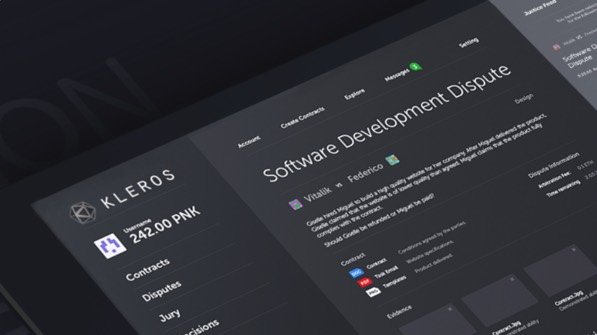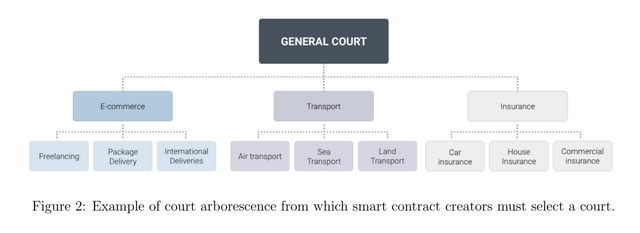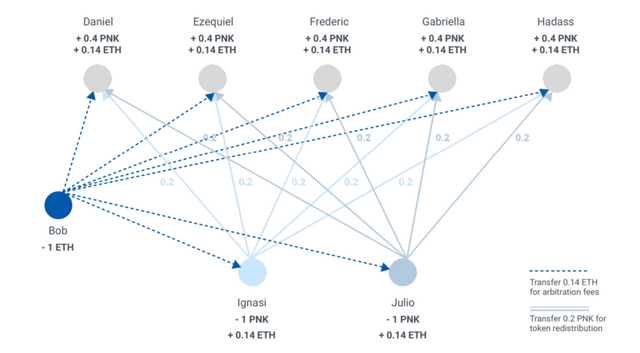Kleros: The Conflict Resolution Protocol in Blockchain.
Introduction
Since time immemorial, disputes between individuals or societies have been frequent. Sometimes, they can be resolved in a friendly and satisfactory manner for the parties involved, but this is not always the case. In these cases, you must go to a court to hear the parties, evaluate the evidence and issue a ruling in favor of one of the parties. This procedure is usually cumbersome, slow and expensive, and it can even affect psychologically the people involved.

In some countries, mechanisms for resolving civil and commercial conflicts have been created through alternative means to the judicial process, which has the help of an impartial third party, the mediator, who facilitates the resolution by the parties themselves.
With the advent and overcrowding of the digital economy, thousands of small and medium-sized companies have emerged and will have to emerge in the coming years. Furthermore, labor relations have undergone a profound change. Nowadays, it is possible to buy goods or contracting services to the other end of the globe without any physical interaction between the parties. But what happens when one of the parties involved in this transaction does not agree with the operation?, to whom it can turn when the resolution of this conflict is likely to be outside the local or regional jurisdiction?.
What is Kleros
Kleros is a decentralized platform that takes advantage of crowdsourcing, blockchain and game theory technologies to develop a multipurpose justice system capable of resolving all types of disputes, from the simplest to the most complex, in a safe and economical way.
Based on a set of juries with a broad domain in various subjects that are available to solve problems. Kleros gives the opportunity to deposit the funds in dispute until the juries issue, and all this is achieved thanks to an efficient contract.
If for any reason a contract is breached, Kleros protects the capital of both parties so that they are not affected.
How Kleros works?
The Kleros conflict resolution mechanism consists of subcourts defined by categories. After the creation of an smart contract, the parties involved would select the details of their integration to the plattform:
- Number of juries
- Contract category (subcourt)
- Outcomes
In the event of a dispute, the juries, who were randomly selected, will receive a series of possible outcomes from which to choose. The options are stipulated by the contracting parties in advance.
.png)
The users have an economic interest in serving as jurors in Kleros earning cool cash in the form of arbitration fee that each member of the jury takes to carry out their work. Candidates will nominate themselves to serve as jurors using a token called pinakion (PNK).
The probability of being chosen as a jury for a specific dispute is proportional to the amount of tokens that a jury deposits. The greater the number of tokens, the greater the probability that will be selected as a jury. The juries that do not deposit pinakions do not have the possibility of being drawn. This prevents inactive juries from being selected.
How does the Kleros mechanism work to resolve disputes?
Once the contract is established by the parties involved, they can establish the specifications with which they will be integrated with Kleros, such as: number of jurors, category of contract (subcourt) and outcomes. After assigning these specifications, both parties can rest assured that if at any time a dispute arises for the contract, it will be handled in an objective manner by qualified persons in the specified field.
How to guarantee the objectivity of the jurors?
This is the most important part in the functioning of the platform since the jurors being people may have the tendency to be subjective and not make the right decision. The Kleros platform has an incentive system to avoid subjectivity and guarantee objectivity in the decisions of the jurors.
Incentive System of Kleros
This system means that in each dispute each jury will get good compensation for each resolved resolved, also encourages honesty in the decisions of each jurors since acting honestly will be rewarded with bonuses or tokens. Of the total votes of all the jurors, one that is not consistent with the majority of the group will lose the bonuses or tokens.
This system also allows to deduce good jurors of poor jurors based on the consistency of their votes. For example, if there are seven jurors with only two "A" and "B" result options, five chose the "A" option while only two chose "B", in this case most chose the "A"option that will result winner and will be considered that the two jurors who leaned for the "B" did not vote honestly, but this in a simple dispute could be coincidence, for this reason, if a juror is inconsistent in more than 100 cases this will be considered deficient and lose the tokens that will win the consistent jurors.

n the image, Bob lost the dispute and pays the fees to the jurors, the two juries who voted incoherent with the group will lose the tokens that will be distributed to the jurors who acted coherently.
Social networks
This field in recent years has had a great boom, so much so that today is a fundamental part in the life of all people and is an essential instruct in modern communication. The users as well as the platforms establish terms and conditions where often these can be violated generating disputes. With Kleros The parties can report violations of the network's policies and deposit a security deposit. If the violation is questioned, a dispute resolution process occurs. If it is ruled that no violation occurred, the reporter loses his security deposit to the accused party.
Conclusion
In the face of any problem that you may have at the cyber level, among freelancers, insurance companies, social networks, travel, finance, etc., Kleros is a decentralized network developed to work with disputes that cannot be carried out in a traditional court, in turn is low cost compared to the traditional model.
Here the jurors issue their evaluations and then take the sentence. The parties will never meet in person at any time like the jurors. The symbol Kleros works with is Pikanion PNK.
Team

For more information watch this short video:
kleros2018
This post has been submitted for the @OriginalWorks Sponsored Writing Contest!
You can also follow @contestbot to be notified of future contests!